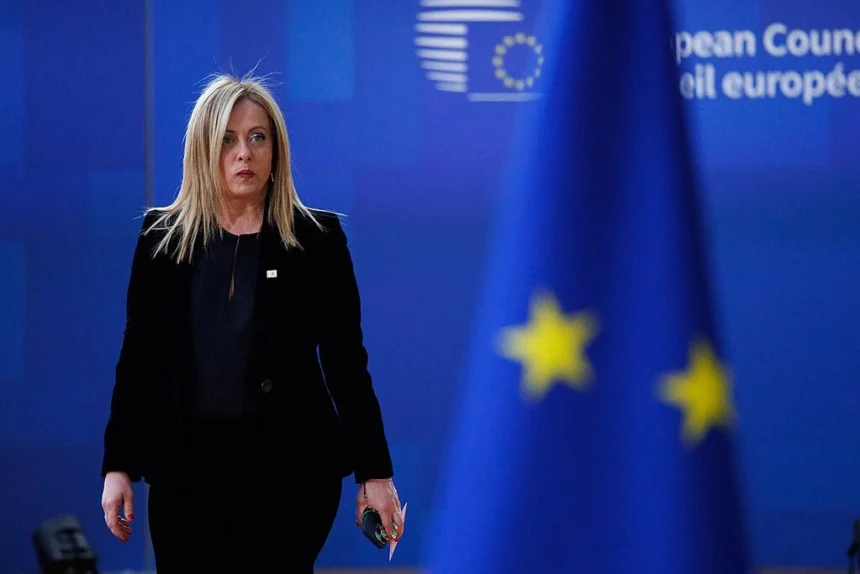The Rise of Far-Right Parties: From Isolation to Mainstream Influence
When, in 1948, a haggard group of neo-fascists from the Movimento Sociale Italiano joined the ranks of freshly elected MPs in the Italian Parliament, few would have expected them to hang around for long.
Similar thoughts would have crossed the minds of those observing the first decade of the French Front National, a period so electorally and organizationally challenging it is known in party circles as the ‘crossing of the desert’.
Fast forward to 1994, the Movimento Sociale Italiano, freshly rebranded as Movimento Sociale Italiano/Alleanza Nazionale, is preparing to become junior partner in a coalition government led by populist firebrand Silvio Berlusconi. Fast forward once again to 2024, and the debate of the summer in France is whether the Front National, now renamed Rassemblement National, will gain enough seats in the National Assembly to form a government.
The success of the far right, both at the national and EU levels, has prompted mainstream parties to shift their positions further to the right and even to consider far-right policies.
How did these two parties go from pariahs to contenders for power, and what, if anything, did Europe have to do with it? This is a question I try to answer in Europe as Ideological Resource: European integration and far-right legitimation in France and Italy. The book traces how two key parties in the history of the post-war European far right, the Movimento Sociale Italiano/Alleanza Nazionale and the Rassemblement National, spoke about Europe and how this enabled them to construct a more appealing political image.
The EU as a Political Resource for the Far Right
The EU has (unwittingly) been a provider of financial, electoral, and symbolic resources for far-right parties. When they were struggling to get elected at home, they found solace in being elected to the European Parliament.
When they were shunned domestically, they could find like-minded parties in the EU. When they were running out of money, their EU roles provided them with a financial lifeline.
The EU has also, I argue, provided far-right parties with ideological resources for their legitimation. Speaking on EU issues gave these parties an opportunity to refashion their political message in a way that resonated with new and old voters alike.
Drawing on the qualitative analysis of over 400 documents produced by Movimento Sociale Italiano/Alleanza Nazionale and the Rassemblement National between 1978 and 2019, I identify four key concepts and discourses that helped these parties promote a better image of themselves: the appeal to a European identity, the reliance on notions of liberty, the characterization of Europe as an endangered space, and calls to pursue the national interest in all matters EU.
Transnational European Identities
When the Movimento Sociale Italiano/Alleanza Nazionale and the Rassemblement National spoke about Europe, they spoke of it as a clearly bounded and distinctive civilisation. This European civilisation was, in their eyes, an identity of sorts—a ‘bigger nation’ to which they belonged.
Europe was not just about identity and liberty; it was also, in the parties’ view, an endangered space.
Although there is a tendency to equate Europe and the EU, the Rassemblement National in particular promoted this European civilisation as something distinct from the EU as a concrete political project. In fact, Marine Le Pen (and her father before her) has gone so far as to claim to be ‘pro-European, but anti-EU,’ presenting the EU as a kind of violation of a true European civilisation.
Speaking of Europe in these terms ‘opened’ the Movimento Sociale Italiano/Alleanza Nazionale and the Rassemblement National’s ideology to a transnational dimension of belonging. Although the nation remained the centre of their ideology, this approach allowed them to present themselves as more open to other peoples and cultures than commonly understood—responding to critiques from those who saw these parties as mere nationalists. However, this ‘opening’ also stayed within clear civilizational boundaries, making it possible to keep traditional voters on board with the distinction between ‘us’ and ‘them.’
Liberty and Shared Narratives
A second, recurrent concept in the Movimento Sociale Italiano/Alleanza Nazionale and the Rassemblement National’s narratives of Europe is that of liberty. They do not use it in the sense of individual liberty, but rather in the sense of a collective form of freedom applicable to the nation and to Europe.

The use of this concept shifts over time. In the 1970s and 1980s, it was used to reclaim the autonomy and power that Europe had lost following World War Two. Both the Movimento Sociale Italiano/Alleanza Nazionale and the Rassemblement National wanted Europe to be free and able to exert influence beyond its borders. However, the parties started diverging from the 1990s. The Movimento Sociale Italiano/Alleanza Nazionale maintained an interest in promoting Europe’s ability to project power, whereas the Rassemblement National lost interest in the project. At the same time, the Rassemblement National started using the language of liberty against the EU, presenting it as a violation of national sovereignty and democratic self-rule.
The use of the language of liberty to approach Europe facilitated the parties’ legitimization because it shifted attention away from some topics that really set them apart from other parties—particularly their approach to national identity—and placed a firmer focus on a concept that is more widely appealing and shared with other actors. This form of legitimacy through shared narratives made the parties look more aligned with key values of their domestic political systems.
Desperate Times Call for Desperate Measures
Europe was not just about identity and liberty; it was also, in the parties’ view, an endangered space. For both the Movimento Sociale Italiano and the Rassemblement National (but not Alleanza Nazionale, which adopted a more moderate language), the world was filled to the brim with threats of all kinds—from external threats such as the Soviet Union or the US, to more domestic ones such as demographic decline, general deviance, the local communist party, and immigration.
Far-right parties remain divided in the European Parliament.
These dangers all threatened Europe’s (and its constituent nations’) existence. From the end of the 1980s, the RN added another threat to an already rich list: the EU, the ‘Trojan horse’ of globalisation. Speaking of constant dangers and emergencies might not, in principle, seem to be a particularly promising way for far-right parties to normalize their own image.
However, crises and emergencies, whether real or purported, convey the idea that an unprecedented emergency requires, or at the very least justifies, an unprecedented response. By identifying a threat, advocating for the need to address it, and identifying themselves as the most appropriate actors to do so, the Movimento Sociale Italiano and Rassemblement National promoted the idea that, given the circumstances, their own ‘extreme’ positions were a commensurate response to the dangers being faced. The identification of threats and their association with an urgent sense of temporality also created an opportunity for them to identify actors well-placed to intervene for the protection of Europe: themselves.
Consistently Nationalist
A final concept the Movimento Sociale Italiano/Alleanza Nazionale and the Rassemblement National used to approach EU politics is that of ‘national interest’. When evaluating whether European unity was a good thing, how the EU as a concrete body operated, and what an ideal European Union would look like, both parties appealed to the notion of national interest.

They thought of some form of European unity as potentially beneficial for the national interest, although they did not necessarily think that the EU in its existing shape truly enabled them to pursue it. For the Movimento Sociale Italiano/Alleanza Nazionale, part of the problem was that the EU lacked a clear foreign policy dimension, while for the RN the issue with the EU was that it affected national sovereignty too strongly.
Both parties also proposed alternative models for EU integration. For the Movimento Sociale Italiano, the ideal Europe would be a ‘nation Europe’, a confederal Europe with a strong foreign policy. Alleanza Nazionale preferred the Gaullist language of a ‘Europe of the homelands’ to refer to a confederal project whose aim should be to intervene when nations cannot act independently. The Rassemblement National’s idea of an ideal Europe has become progressively less ambitious: if, in the 1980s and early 1990s, they seemed to favour a kind of confederal project, the party has since preferred to promote ad-hoc collaborations between European countries.
Drawing on the concept of national interest to develop positions on the EU helped the parties emphasize commitment to the core principle of their ideology: the nation. Speaking of the EU in these terms enabled them to restate their allegiance to their ideological principles and to show their supporters that they remained committed to these principles, applying them to new issues. In this way, they could renew their commitment to the past, while moving towards a different future.
Where to for the Far Right in Europe?
Europe as Ideological Resource stops in 2019, but is Europe still an ideological resource today, and have far-right parties changed their stance on Europe? Many of the discourses I identified are still present in contemporary far-right parties. Their strength might be weakened—partially because Europe is no longer new, and far-right parties seem to need less and less normalizing. Europe, however, still carries some traction as a legitimizing mechanism. For example, when Giorgia Meloni of the far-right Brothers of Italy (incidentally, the successor party of the Movimento Sociale Italiano/Alleanza Nazionale) came to power in Italy, her approach to the EU was a significant part of her normalization.
This leads to a second point worth considering, especially after the 2024 EU elections. Far-right parties are often viewed as Eurosceptic, and that is not necessarily incorrect. However, their approach to Europe is more complex than simply ‘we hate the EU’. There are divergent approaches both over time and within the same party family, for example, between those who adopt a pragmatic stance on the EU, those who aim to change it from the inside, and those with a radically oppositional approach. This is not particularly new and helps explain, in part, why the far right remains divided in the European Parliament.
The far right’s divisions in the European Parliament may have prevented it from gaining further direct influence over its functioning, but this does not mean that its impact on EU politics has been insignificant. The success of the far right, both at the national and EU levels, has prompted mainstream parties to shift their positions further to the right and even to consider far-right policies and solutions as appealing alternatives. This, in turn, has normalized both far-right positions and politicians, contributing to their further entrenchment in European politics.









